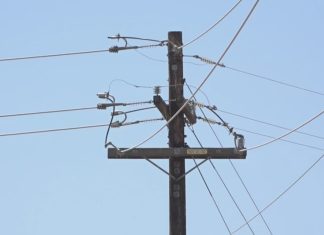Russia’s first domestically produced artificial intelligence-powered humanoid robot faceplanted during its first public demonstration this week, underscoring the challenges Russia faces in competing with more established leaders in AI and robotics like the U.S. and China.
The robot, named AIdol, was unveiled during a tech showcase at the Yarovit Hall Congress Center in Moscow on Monday. As the machine walked onto the stage accompanied by two handlers to “Gonna Fly Now,” the theme from the 1976 film Rocky, it waved to the audience before taking a few steps, losing its balance, and toppling over. Event staff rushed to cover the fallen robot with a black cloth and carried it from the stage, cutting the presentation short. You have to see it for yourself.
Vladimir Vitukhin, CEO of the Moscow-based startup Idol, attributed the fall to calibration issues potentially caused by the robot’s stereo cameras being overly sensitive to the lighting conditions in the hall. “This is real-time learning, when a good mistake turns into knowledge, and a bad mistake turns into experience,” Vitukhin told attendees following the incident, according to Newsweek. “I hope that this mistake will turn into an experience.”
The robot was later brought back onstage and managed to remain upright with assistance from handlers. Vitukhin maintained AIdol sustained no damage from the fall.
AIdol is designed to perform three main functions: walking, object manipulation, and communication with people. The humanoid can perform up to six hours of autonomous operation, according to the company, and its face is capable of expressing at least 12 basic emotions and “hundreds” of microexpressions through its flexible silicone skin. All of the robot’s systems function offline. The video below offers a pretty good idea of what AIdol looks like up close, including its face.
🇷🇺 Russia’s first humanoid AI robot, Aidol (Artificial Intelligence Doll), fell face-first during its public debut in Moscow.
The robot managed a wave before collapsing.Handlers rushed to help and later covered the scene with a sheet.
Developers blamed poor lighting and… pic.twitter.com/kq8NgbVXrn— Info Connect (@infoconnectnow) November 12, 2025
According to the company, 77% of AIdol’s components are Russian-made, and it plans to raise that number to 93% when the robot eventually enters mass production. Russia, of course, faces sanctions from Western nations over the country’s invasion of Ukraine, which has restricted the country’s access to advanced electronics, semiconductor components, and other critical technologies needed for robotics development.
Russia’s robotics sector has struggled mightily since it invaded Ukraine, when major international manufacturers exited the Russian market in response to sanctions. The country has faced ongoing challenges related to component shortages and a loss of engineering talent.
Notably, AIdol’s less-than-ideal debut really highlights just how far behind it is compared to some international competitors. Boston Dynamics’ Atlas robot, for example, can parkour and manipulate objects on its own, thanks to machine learning-powered vision systems. Chinese manufacturers have also made significant advances in humanoid robots—just last week, world’s richest man Elon Musk said “Tesla and China companies will dominate the [robotics] market.”
The developers at Idol envision AIdol being deployed in manufacturing, logistics, and public-service areas like banks and airports. However, the company has not disclosed which specific AI system powers the robot, or when we can expect mass production to begin.







